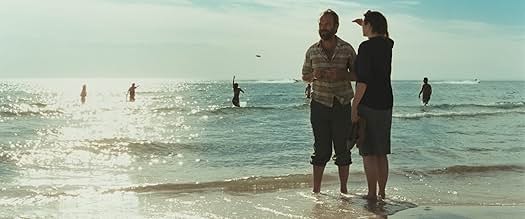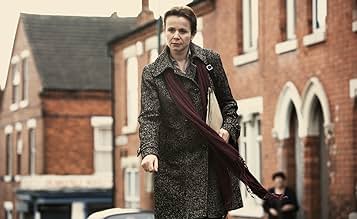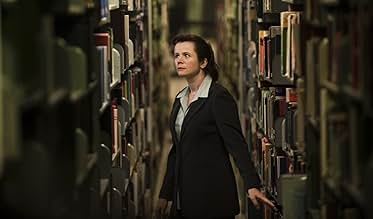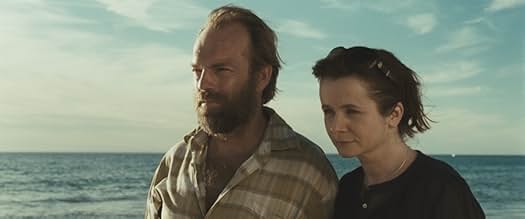IMDb-BEWERTUNG
7,1/10
6106
IHRE BEWERTUNG
Füge eine Handlung in deiner Sprache hinzuSet in 1980s Nottingham, social worker Margaret Humphreys holds the British government accountable for child migration schemes and reunites the children involved -- now adults living mostly ... Alles lesenSet in 1980s Nottingham, social worker Margaret Humphreys holds the British government accountable for child migration schemes and reunites the children involved -- now adults living mostly in Australia -- with their parents in Britain.Set in 1980s Nottingham, social worker Margaret Humphreys holds the British government accountable for child migration schemes and reunites the children involved -- now adults living mostly in Australia -- with their parents in Britain.
- Regie
- Drehbuch
- Hauptbesetzung
- Auszeichnungen
- 10 Gewinne & 21 Nominierungen insgesamt
Heath Tammy
- Susan
- (as Tammy Wakefield)
Alastair G. Cumming
- Australia House Official
- (as Alistair Cummings)
Empfohlene Bewertungen
Oranges and Sunshine – CATCH IT (B+) The film tells the story of Margaret Humphreys, a social worker from Nottingham who uncovered the scandal of "home children", a scheme of forcibly relocating poor children from the UK to Australia and Canada. Margaret reunites estranged families and brings worldwide attention to the cause. Deported children were promised oranges and sunshine but they got hard labor and life of misery and sexual abuse in institutions such as Keaney College in Bindoon, Western Australia. (Wiki) Oranges and Sunshine is a sensitive subject matter which defiantly put Britain in Shame when Margaret Humphreys broke out the story in 80s. Emily Watson's portrayal of Margaret Humphreys' trouble to help the transported kids all the way to Australia is heart wrenching. The emotional turmoil she goes to work for them while managing her family is something really inspiring. Emily Watson is a great actress and no doubt she brings her emotional range to the real life role model. In supporting cast Hugo Weaving & David Wenhem did a fine job. Overall, it's a sensitive movie about a sensitive issue. Keep in mind its tear jerker, so keep a box of tissue.
Should anyone ever question the value of the film industry then the innocently titled "Oranges and Sunshine" is a film that, on its own, could quite easily justify its existence.
Whilst the acting, production and direction are superb, the film's dark subject matter overshadows all, and its disturbing revelations require no dramatisation. As the psychological damage caused to a whole generation of "stolen" children becomes clear, it is difficult to comprehend the sheer immensity of the systematic betrayal of trust suffered by a staggering number of British families, and perpetrated by those in authority who should have known better.
"Oranges and Sunshine" covers a mere handful of tragic stories in various ways, all very effective. These stories expose a truly shameful episode in British history, and the way in which those affected adapted to their fate - with varying degrees of success. What is clear though is that for better or worse, this childhood experience has indelibly marked them for the rest of their lives.
Although the children who were torn away from their mothers may not have been marshalled roughly onto rail wagons, on a one way trip to oblivion, a very clear parallel can be drawn between the ghastly regime in Nazi Germany, and the ghastly regimes that allowed this despicable scheme to continue, and which do not appear, from the facts as depicted in this film, to have been brought to account.
The parallel is that when good men and women fall silent, and no-one challenges the systemic abuse of power by those in authority, then the arrogant, the incompetent, the weak-willed, the lazy and, indeed, the downright evil, triumph.
To me that is the enduring message of this brilliant yet incredibly sad film. It is a repeated lesson we seem incapable of learning, no matter how many times emotionally evocative films like this attempt to remind us.
Whilst the acting, production and direction are superb, the film's dark subject matter overshadows all, and its disturbing revelations require no dramatisation. As the psychological damage caused to a whole generation of "stolen" children becomes clear, it is difficult to comprehend the sheer immensity of the systematic betrayal of trust suffered by a staggering number of British families, and perpetrated by those in authority who should have known better.
"Oranges and Sunshine" covers a mere handful of tragic stories in various ways, all very effective. These stories expose a truly shameful episode in British history, and the way in which those affected adapted to their fate - with varying degrees of success. What is clear though is that for better or worse, this childhood experience has indelibly marked them for the rest of their lives.
Although the children who were torn away from their mothers may not have been marshalled roughly onto rail wagons, on a one way trip to oblivion, a very clear parallel can be drawn between the ghastly regime in Nazi Germany, and the ghastly regimes that allowed this despicable scheme to continue, and which do not appear, from the facts as depicted in this film, to have been brought to account.
The parallel is that when good men and women fall silent, and no-one challenges the systemic abuse of power by those in authority, then the arrogant, the incompetent, the weak-willed, the lazy and, indeed, the downright evil, triumph.
To me that is the enduring message of this brilliant yet incredibly sad film. It is a repeated lesson we seem incapable of learning, no matter how many times emotionally evocative films like this attempt to remind us.
Sarah's Key was critically lauded for its reliable method of evoking raw anguish in its audience by depicting the trauma of a savage injustice from a child's perspective. In the same year, Jim Loach's feature drama handles the similar material of an scandal that's just about on par with the Vel d'Hiv roundup, but the film's subjects are all well into adulthood by the time we are meeting them. The fact that the victims are always shown as adults (in physical form at least) has given the achievement of pulling off this excellent film a higher degree of difficulty, seeing as the actors and screenplay writers are required to work extra hard to win the audience's sympathy, rather than having the simple forgivable innocence of an actual child on screen doing the job. However, this is not to say that Sarah's Key was mere emotional pornography: it found excellent ways of challenging itself in other aspects which gave it a greater level of sophistication, but in terms of expressing the heartbreak, the feat of Oranges and Sunshine is much more remarkable.
Among the topics being explored here is the very complicated issue of adoption. The burdensome puzzle of how a child in an unstable family situation or an unhealthy state of living should receive professional help – whether such interference is truly protecting their best interests or inflicting deep psychological harm by depriving them of family – has long been troubling child protection authorities. In mid- twentieth-century England, the popular solution settled on was the organised deportation of these children to Australia. Told that they were orphans, with no living relatives to care for them, they would be sent over in large numbers and, once there, sold into slavery for a respected church organisation commonly refferrred to as "The Brothers".
Several decades later, a determined social worker from Nottingham has begun to single-handedly reunite the victims of the outrage with their family back in England. As they relate to her their heartwrenching stories, each with their own despicable atrocities on top of what has already been mentioned, the irreparable damage of being raised without a proper family becomes apparent, and they are reduced to miserable, vulnerable, homesick little children. Its frequent mentioning of mothers, its claim that the wound of lost parents will never truly heal, and the fact that most of the victims shown are boys creates very distinct allusions to Peter Pan, even before that similarity is actually mentioned by one of the people. An additional noticeable parallel between this film and another classic story is the idea of a child suffering lonesomely at the hands of a cruel organisation under the sneaky pretense that they are an orphan, which is reminiscent of Oliver Twist.
However, it would be grossly unfair to just cynically dissect this film using only comparisons: it displays a very impressive divergence from the typical conspiracy drama. Its most prominent asset is the fully- fledged characterisation of its activist hero and the equal attention spent on showing her suffering as well that of her clients. The delightful Emily Watson obviously does a great deal to bring her to life, playing her so brilliantly that she comes across as both perfectly likable and humanly multi-faceted. Hearing such painful stories is incredibly taxing, and the growing unpopularity she is gaining as she stirs the government and the press results in some truly terrifying personal attacks while she is staying in Australia, but as the authorities are refusing to assist her, she knows that she must not allows herself to withdraw from her mission as no one else will be willing to pick it up. She does, of course, also become estranged from her family as the task begins to consume her, but thankfully not instantly, allowing the satisfying realism to remain intact.
Also a relief is that a handful of the people she is helping are actually showing genuine gratitude and returning the favour by giving her personal assistance. The friendships she forms with these people are truly touching, and effectively lighten the situation for both the hero (Margaret) and the audience.
With a very capable supporting cast, featuring David Wenham, Hugo Weaving and Tara Morice (Strictly Ballroom), in the roles of the victims and Margaret's family, this is a highly commendable and worthwhile piece of filmmaking, let down only by the rather repetitive nature of the script, if anything.
Among the topics being explored here is the very complicated issue of adoption. The burdensome puzzle of how a child in an unstable family situation or an unhealthy state of living should receive professional help – whether such interference is truly protecting their best interests or inflicting deep psychological harm by depriving them of family – has long been troubling child protection authorities. In mid- twentieth-century England, the popular solution settled on was the organised deportation of these children to Australia. Told that they were orphans, with no living relatives to care for them, they would be sent over in large numbers and, once there, sold into slavery for a respected church organisation commonly refferrred to as "The Brothers".
Several decades later, a determined social worker from Nottingham has begun to single-handedly reunite the victims of the outrage with their family back in England. As they relate to her their heartwrenching stories, each with their own despicable atrocities on top of what has already been mentioned, the irreparable damage of being raised without a proper family becomes apparent, and they are reduced to miserable, vulnerable, homesick little children. Its frequent mentioning of mothers, its claim that the wound of lost parents will never truly heal, and the fact that most of the victims shown are boys creates very distinct allusions to Peter Pan, even before that similarity is actually mentioned by one of the people. An additional noticeable parallel between this film and another classic story is the idea of a child suffering lonesomely at the hands of a cruel organisation under the sneaky pretense that they are an orphan, which is reminiscent of Oliver Twist.
However, it would be grossly unfair to just cynically dissect this film using only comparisons: it displays a very impressive divergence from the typical conspiracy drama. Its most prominent asset is the fully- fledged characterisation of its activist hero and the equal attention spent on showing her suffering as well that of her clients. The delightful Emily Watson obviously does a great deal to bring her to life, playing her so brilliantly that she comes across as both perfectly likable and humanly multi-faceted. Hearing such painful stories is incredibly taxing, and the growing unpopularity she is gaining as she stirs the government and the press results in some truly terrifying personal attacks while she is staying in Australia, but as the authorities are refusing to assist her, she knows that she must not allows herself to withdraw from her mission as no one else will be willing to pick it up. She does, of course, also become estranged from her family as the task begins to consume her, but thankfully not instantly, allowing the satisfying realism to remain intact.
Also a relief is that a handful of the people she is helping are actually showing genuine gratitude and returning the favour by giving her personal assistance. The friendships she forms with these people are truly touching, and effectively lighten the situation for both the hero (Margaret) and the audience.
With a very capable supporting cast, featuring David Wenham, Hugo Weaving and Tara Morice (Strictly Ballroom), in the roles of the victims and Margaret's family, this is a highly commendable and worthwhile piece of filmmaking, let down only by the rather repetitive nature of the script, if anything.
I can only give this a 10/10 due to the fact that i grew up with many of the fairbrigians and the Bindoon and Clontarf boys. I am a 62 year old and still socialise with some of these people. Fairbridge in Western Australia is situated just south of Perth and very close to Pinjarra. Every year they hold a Fairbridge festival that lasts for a whole weekend and hosts lots of activities including top groups and singers. I myself was once committed to a boys institution and met many of these kids that had ran away from Bindoon and other institutions that were abusive to them. Kingsley Fairbridge was not the abusive type and most Fairbrigians do not tell the same story as the Christian brothers torture. This movie portrays the story of Margaret Humphrey and her quest to find these -(now grown ups) to find their real parents. Only a very small portion found relatives. The goof here says that Margaret couldn't have moved to a stone house in Perth. Fremantle was the first landing and the first settlers along with convicts dug out a huge section of one of the hills which was limestone. Limestone was used for the building of almost -ALL the first buildings including the Fremantle prison. Many more houses and buildings in both Fremantle and Perth still stand today. I loved the movie and i believe it is very much close to the truth. A must to see.
I saw this truly extraordinary film last night ... and know now that it will be with me for a long time to come. The story is totally compelling and the acting is superb! Emily Watson is always a wonder to watch and she does some of her finest work here -- perhaps her best performance ever. The supporting players are, without exception, highly gifted and each finds his or her character to the point where you feel, at times, that you are watching a documentary, so fine are their portrayals. Based on the true experiences of social worker Margaret Humphreys (that will leave you with your mouth agape often)and with a beautifully written script that moves briskly ... and, at many turns, into frightening territory, with terrific direction, this is a must-see! Put it on your list! If there is any justice, this one will figure when the awards are handed out!
Wusstest du schon
- WissenswertesBased on true events, Margaret Humphreys was awarded the Medal of the Order of Australia in 1993, and awarded Commander of the British Empire in 2011 for her work.
- PatzerWhen Margaret is searching through the Public Records of Births and Marriages each entry gives full details, is handwritten, and sorted by town and presented in chronological order. In reality, to protect data they are single-line typed entries giving basics and references for obtaining full details, for anywhere in the country, and sorted alphabetically by surname for each quarter of the year.
- VerbindungenFeatured in Breakfast: Folge vom 23. März 2011 (2011)
- SoundtracksWild World
Written and performed by Cat Stevens
Courtesy of Universal-Island Records Ltd
Courtesy of Universal Music Operations Ltd
Published by EMI Music Publishing Ltd
Top-Auswahl
Melde dich zum Bewerten an und greife auf die Watchlist für personalisierte Empfehlungen zu.
- How long is Oranges and Sunshine?Powered by Alexa
Details
- Erscheinungsdatum
- Herkunftsländer
- Offizielle Standorte
- Sprache
- Auch bekannt als
- Oranges & Sunshine
- Drehorte
- Adelaide, South Australia, Australien(location)
- Produktionsfirmen
- Weitere beteiligte Unternehmen bei IMDbPro anzeigen
Box Office
- Budget
- 4.500.000 $ (geschätzt)
- Bruttoertrag in den USA und Kanada
- 143.480 $
- Eröffnungswochenende in den USA und in Kanada
- 18.600 $
- 23. Okt. 2011
- Weltweiter Bruttoertrag
- 5.017.653 $
- Laufzeit
- 1 Std. 45 Min.(105 min)
- Farbe
- Sound-Mix
- Seitenverhältnis
- 2.35 : 1
Zu dieser Seite beitragen
Bearbeitung vorschlagen oder fehlenden Inhalt hinzufügen
























